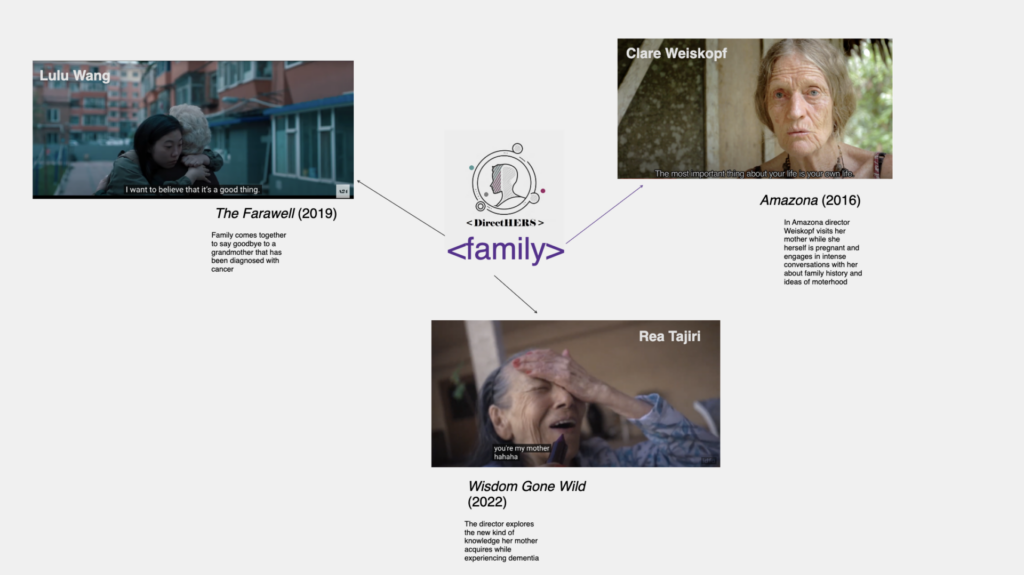Week 9: <!ELEMENT family (description) > or <!ELEMENT behindthescene (#PCDATA, citation)> (Miaoling’s creative DTD structure)
Follow our (for now) empty Twitter account: @DirectHERS
Clare Weiskopf (British-Colombian), Lulu Wang (Chinese-American) and Rea Tajiri (Japanese-American) have all done films exploring their family ties, their mothers or grandmothers and their views on personhood and motherhood. In Amazona (2016) director Weiskopf visits her mother, an 80-year old woman who lives in a village on the Amazon jungle. Weiskopf is pregnant and embarks on an intense journey to explore their family history and the decisions her mother took during her life. Wisdom Gone Wild (2022) portrays the relationship between Rea Tajiri’s mom and her, it reveals how the parenting roles evolve and merge as her mother deals with dementia. Rather than wanting her mother to remember the “truth” or “reality” the director portrays dementia as a sort of new wisdom, a new perspective on life, a vision gone wild. And The Farewell (2019) tells the story of a family that decides to hide from their grandmother the fact that she’s been diagnosed with cancer. To say goodbye, the family travels together and spends with their grandmother whatever remaining time she might have left. All of this films deal with the director’s personal lives so, how do you separate the two? their profiles are intertwined with their work and the work with who they’ve been. As of now, in our XML language this means:
<based_on>true life story</based_on>

We’ve started to tag things like this. But how to choose the correct words? and why is that important? We have sort of grouped them under <family> or <behind_the_scene> or <based_on>. I’m mesmerized with the connections. Why are they all three dealing with the same themes? is it inherently feminist? To portray the personal on a close-up camera angle. As much as it would be lovely to grapple longer with this questions and reflect, we don’t have the time and must make decisions. If time wouldn’t be a concern I would love to explore coming up with names for tagging <motherhood> or <grandmotherhood> or <daughterhood>. In Amazona there’s a moment in which the director ask her mother: “Did you ever feel that your needs came first than your children’s?” to which her mother replies, “I think so”, because “the most important thing about your life is your own life”. There are so many interesting debates dealing with this questions. What is motherhood anyways? are we romanticizing a historically care labor unequally and unjustly assigned only to those bodies deemed as reproductive and so tagged as “women”? Or is there something about the labor, affect, care and responsibility of being a mother that gives the tag “women” a distinctive and unique way of experiencing life? But <women>, as many feminist thinkers have told us, should not be seen as an essential category and rather as a political category. Today, we were discussing intensely our DTD structure, which is basically (as our PM brilliantly put it) our common agreement on what elements will be present in the XML file. The correct avenues of thought. And why is that important? Why are labels in life so important? Anyways, as of now all the intense questions arising from the work of this directors are headed sort of under <family>…but not sure, the possibilities could be endless it seems. No answers. Just questions. This post is an invitation to see the films because they are beautiful, that is, if you can find them and a bit outreach on the side, why don’t you follow us on twitter! c:


